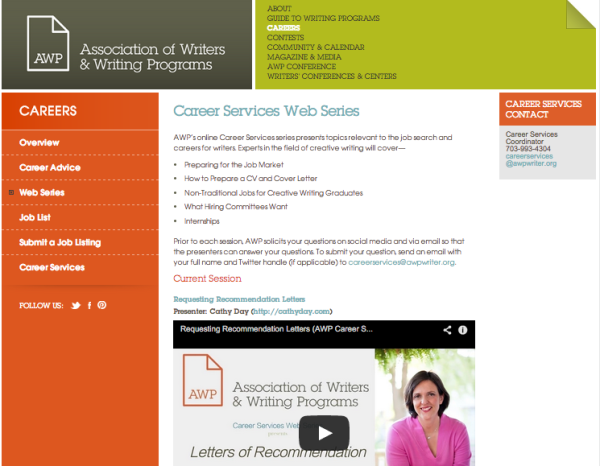Everything I know about Letters of Recommendation
Note: This is about LORs for the academic job market, not for applying to MFA programs. That post is here.
True Story
 A few years ago, a writer I knew (I’ll call her Chris) sent me an email asking me for some information. A graduate creative writing program had asked her to speak with their MFA students about “going on the market.” How to do a CV. How to write a good letter of application. How to read job ads. How to ask for LORs. That sort of thing.
A few years ago, a writer I knew (I’ll call her Chris) sent me an email asking me for some information. A graduate creative writing program had asked her to speak with their MFA students about “going on the market.” How to do a CV. How to write a good letter of application. How to read job ads. How to ask for LORs. That sort of thing.
The problem was that Chris was not on the faculty of that (very prestigious) MFA program. She was visiting and had only been on the job market in a limited way. So when Chris asked me if I would share my job search materials with her to share with MFA students in this program, here’s what I said:
You know, no. And I’ll tell you why.
First, I think that it’s the responsibility of the faculty of that very fine school to mentor their students. Not mine. And really, not even yours. THEY need to make their CVs and job letters and wisdom available to people who worked really hard to get into that school. That is why one works hard to get into that school–for access to that sort of thing.
Second, my materials are for my students and for my friends. If YOU want to see my letter, my CV, really ANYTHING, I would give it to you in a heartbeat. But not to them.
Chris said she understood, and that the faculty who’d asked her to speak understood, too, but this represented their good faith effort.
Because professionalizing MFA students for the job market just had never been a part of their program culture or the department’s infrastructure.
Because–let’s be serious now–how ethical is it to professionalize thousands and thousands of MFA students for roughly 100 tenure-track jobs that open up each year?
Most graduate MFA programs will tell you that their mission, their culture is built on mentoring writers via a focus on craft, not on professionalizing academics.
Infrastructure
Should you build academic professionalization into an MFA program?
Let’s pretend that you think the answer is Yes.
So, how do you build academic professionalization into an MFA program?
Here’s what happens at some graduate programs
Ideal:
- Graduate faculty are assigned to mentor the students in their area (CW, Lit, Rhet Comp, etc.) who are going on the job market.
- Discipline-specific meetings held to discuss how to read job ads, how to assemble your application, how to give a “job talk,” feedback on materials, mock interviews, nuances of the job market in that particular discpline, etc.
- This work is either part of the faculty member’s load (a course they teach) or is part of their service/committee assignment.
Okay, but not ideal:
- A graduate faculty committee (of one or many) is assigned to mentor students in ALL areas who are going on the job market.
- Non-discipline specific meetings held to discuss the academic job market in general. Mostly pitched to PhD students, but MFA students attend and translate the advice for their own purposes. (This is the kind of experience I had as a grad student.)
- This work is done on a volunteer basis by faculty (never a good idea).
I’ll be blunt
Look, I’ve worked in two MFA programs. I know how hard it is to professionalize MFA students. Where does that work go? And how do we do it ethically?
I believe that we shouldn’t be “academifying” MFA students. We should be giving them a lot of stars to steer by. The problem is that most of us followed one, maybe two stars. How are we supposed to help MFA students figure out how to become something very different from what we ourselves are–as writers and as professionals?
This is the question I ask myself: if we put more MFAs on the job market with good materials, good applications, good credentials, are we making the adjunct crisis worse, or could we make it better?
This is the question I ask myself: what’s it going to take for the faculty distribution/balance in English Studies to look something more like its student distribution/balance? Because I’ve worked a lot of places, and the numbers of CW faculty are always low while the numbers of CW students are high.
This is the question I ask myself: are we doing right by our MFA graduates?
This is the question I ask myself: when AWP asked me to create a webinar sharing my secrets and hard-won wisdom about professionalization, did I do the right thing? Isn’t it just like Chris’s request? Why should I help strangers? Why should AWP professionalize MFA students? Shouldn’t the programs themselves be telling students the things I put in this 40-minute webinar?
Those are a lot of questions, I know.
I’ve written elsewhere on this topic, and I’ll keep thinking and writing about it. I know I will.
For now, here is everything I know (pretty much) about Letters of Recommendation. If you teach in an MFA program, send this to your students. If you’re on the job market or you’re thinking about it, watch it.
I hope it helps you. I hope it helps us all.
I really really want to know what you think about this. Please tell me. Please tell AWP Career Services.
CW Programs